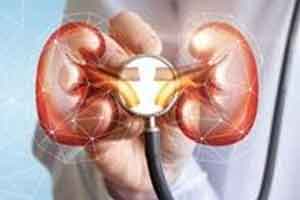- Home
- Editorial
- News
- Practice Guidelines
- Anesthesiology Guidelines
- Cancer Guidelines
- Cardiac Sciences Guidelines
- Critical Care Guidelines
- Dentistry Guidelines
- Dermatology Guidelines
- Diabetes and Endo Guidelines
- Diagnostics Guidelines
- ENT Guidelines
- Featured Practice Guidelines
- Gastroenterology Guidelines
- Geriatrics Guidelines
- Medicine Guidelines
- Nephrology Guidelines
- Neurosciences Guidelines
- Obs and Gynae Guidelines
- Ophthalmology Guidelines
- Orthopaedics Guidelines
- Paediatrics Guidelines
- Psychiatry Guidelines
- Pulmonology Guidelines
- Radiology Guidelines
- Surgery Guidelines
- Urology Guidelines
Acute Kidney Injury Linked to Higher Risk of Dementia

Acute Kidney Injury, even with complete kidney recovery, is associated with a significantly increased risk of hospitalized dementia, reports the findings of a study presented at ASN Kidney Week 2018 at the San Diego Convention Center.
The study revealed that patients with acute kidney injury had more than a 3-fold higher risk of developing dementia compared with those without acute kidney injury.
Read Also: Atrial fibrillation linked to higher odds of dementia
Jessica Kendrick and associates tested the hypothesis that AKI, even with complete kidney function recovery, is associated with a higher risk of developing dementia.
The researchers performed a retrospective propensity score-matched analysis of 2,082 patients without prior history of dementia from an integrated health care delivery system in Utah, who had a hospital admission between January 1, 1999, and December 31, 2009.
AKI was defined by ICD-9 codes and AKI Network serum creatinine values. 1041 patients with AKI followed by complete recovery, defined as discharge creatinine <1.10 times the pre-admission baseline value, were propensity score-matched with 1041 patients without AKI during the index admission. Dementia was defined by ICD-9 codes.
The study found that during a median follow-up time of 5.8 years, 97 patients developed dementia. More patients with AKI developed dementia (7.0% vs. 2.3%), and patients with AKI had more than a 3-fold higher risk of developing dementia compared with those without Acute kidney injury.
Read Also: One of largest study links osteoporosis with dementia
“Acute kidney injury (AKI) is linked with a higher risk of developing dementia and further studies are needed to examine the association of AKI with cognitive dysfunction,” writes the author.
AKI, an abrupt decline in kidney function, often arises after major surgeries or severe infections, and it is associated with long-term health problems including the development of chronic kidney disease and cardiovascular disease. Acute kidney injury is also associated with acute neurologic complications.
For reference log on to
https://www.asn-online.org/education/kidneyweek/2018/program-abstract.aspx?controlId=3024328

Disclaimer: This site is primarily intended for healthcare professionals. Any content/information on this website does not replace the advice of medical and/or health professionals and should not be construed as medical/diagnostic advice/endorsement or prescription. Use of this site is subject to our terms of use, privacy policy, advertisement policy. © 2020 Minerva Medical Treatment Pvt Ltd